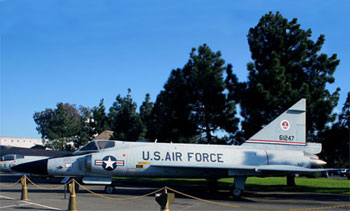|
Captured World War II German technical information regarding the feasibility of an aircraft equipped with a delta wing lead to the inception of Convair's F-102 "Delta Dagger." The F-102 was affectionately known as the "Duece."
The prototype "Delta Dagger" successfully took to the air on the 24th of October 1953. The first operational posting of the F-102 was with the Air Defense Command's 327th Fighter Interceptor Squadron, George Air Force Base, California.

Exactly 1000 "Delta Daggers" of all variants were produced. The F-102 saw service with the United States Air Force's Alaskan Air Command, Pacific Air Forces, Air Defense Command and the United States Air Forces in Europe.
Operating in Vietnam from 1962 until the summer of 1970, the "Delta Dagger" flew supersonic interceptor missions and provided combat air cover for our B-52s.
In the early 1970s, the Air Force's front line squadrons began to re-equip with the McDonnell-Douglas F-4C "Phantom II." This signaled the beginning of the end for the F-102, and the "Duece" was transferred to Air National Guard units. During this period, the air forces of Greece and Turkey began to receive the F-102. Both countries operated their F-102s into the late 1970s.
The final type phase out of the "Duece" was complete in the spring of 1976, when all operational F-102s were transferred to the Military Aircraft Storage and Disposition Center (MASDC), Davis-Monthan Air Force Base, AZ.
Some aircraft were scrapped, while others were converted into PQM-102 remotely controlled target drones. The last PQM-102 was destroyed by a missile in 1984.
F-102's replaced the F-86D at Travis in early 1958.
Our F-102 “Delta Dagger” was delivered to the Air Force from the Convair assembly line at San Diego on September 21st, 1957. From 1959 to 1964, it served with the United States Air Forces in Europe as an air superiority fighter and in May of 1965, it was returned stateside to join the Air Defense Command. Her last posting was with the 154th Fighter Group based at Hickam Air Force Base, Hawaii. Her last flight was sometime in 1976, just prior to the type phase out.
Being in Hawaii was her saving grace. Instead of being flown to the scrap yard for reclamation, she ended up as a gate guardian. The Travis Museum rescued the F-102 just days before the rare fighter was to be scrapped. She was disassembled and flown to the museum in a C-5A "Galaxy." The F-102 was completely refurbished by Museum volunteers, and was the first aircraft acquired by the Museum. It is painted as an 82nd Fighter Interceptor Squadron aircraft which was based at Travis in the early 1960s.
Specifications:
- Wing Span: 38'1.5"
- Length: 68'4.5"
- Height: 21'2"
- Maximum Speed: 825 M.P.H. at 36,000 Ft. Mach 1.25
- Service Ceiling: 54,000
- Ft. Range: 1,350 Miles
- Crew: one
- Armament: 6 x AIM-4 Falcon missiles, carried internally, 24 2.75 Folding FIN "Mighty Mouse" Rockets in the missile bay doors, or the GAR-1 1 atomic air to air missile
- Engines: 1 x Pratt & Whitney J-57-P-23 turbojet rated at 17,200 Lbs. thrust.
Information derived from “Travis Air Force Museum” by Nick Veronico copyright Travis AFB Historical Society/Jimmy Doolittle Air and Space Museum Foundation. This book is available from the Jimmy Doolittle Air and Space Museum GIFT SHOP located in the Travis Air Museum.
|